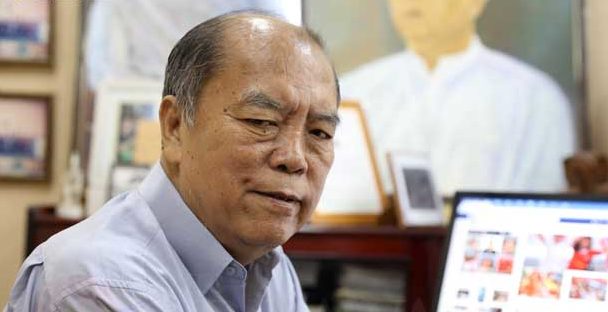U Tun Lwin, a popular local weatherman whose attempts to warn of the approach of the deadly Cyclone Nargis in 2008 were largely ignored by local people and authorities in the Irrawaddy Delta, died on Monday afternoon. In memory of the meteorologist, The Irrawaddy revisits this July 2015 review of his memoir “Nargis and I”, which was published in that year.
RANGOON — One long and frightening night in early May seven years ago, Dr. Tun Lwin was sitting in the darkness of his office as the wind howled outside. The storm he had forecast days before had knocked out the electricity, the internet and phone lines. It rained like doomsday.
Cyclone Nargis was approaching Yangon.
With the complete communication breakdown, the director-general cum consultant in Myanmar’s Department of Meteorology and Hydrology (DMH) was virtually cut off from the real-time situation on the ground.
But the 60-year-old meteorologist, who had been following the storm since it first materialized as an atmospheric depression in the Bay of Bengal more than a week ago, couldn’t help making the mental calculations of its strength and predicted route by observing the growing speed and direction of the wind outside.
At around midnight, when the cyclone hit Myanmar’s commercial capital, a windowpane shattered behind him and the whole building trembled in the face of 128 mile per hour winds. He felt helpless; all he could do was say silent prayers.
“On that night until 5 am the next day, Nargis was like a bull elephant in musth, destroying everything [in its path],” Dr. Tun Lwin writes in his memoir, “Nargis and I,” recalling the cyclone that devastated Myanmar’s Ayeyarwaddy delta and beyond, killing more than 130,000 people after making landfall on the night of May 2, 2008.
Published last month on the seventh anniversary of the cyclone, the book is the latest to document the country’s deadliest natural disaster.
Unlike other books on Nargis, the memoir objectively analyzes the factors that intensified the destruction wrought by the cyclone and is also a comprehensive personal account of how the DMH’s former director-general played a leading role in forecasting the storm and releasing warnings to the public.
In his foreword to the Myanmar-language book, Dr. Tun Lwin writes that readers should take lessons from the failures in response and preparation for Cyclone Nargis to prevent the recurrence of a tragedy on a similar scale.
“I have no intention to blame other people for their failure. We are all responsible for what we faced during Nargis… [But] as long as we don’t know the root cause of the problem and weaknesses, we will never get to the truth,” he writes.
In the memoir he explains that a huge death toll was inevitable despite his 48-hour early warning to local authorities and that people living in the delta, the area hit hardest by the cyclone, suffered in lieu of effective emergency response and evacuation measures, citing a joint assessment report coauthored by DMH and the Asian Disaster Preparedness Center in Thailand.
“Even though people there received early storm and tidal surge warnings, they had no storm shelters to take refuge in or higher ground [to evacuate to] when the 22-foot-high tidal surge was generated by the storm. The area is densely populated and local people lacked experience as the delta had never been hit by a cyclone in 132 years,” he writes.
“If the cyclone hit the Rakhine coastal region, I can guarantee that casualties will not be that high as people there generally have more experience with cyclones and strictly follow the warnings.”
Aside from the analytical insight into how Nargis turned out to be such a deadly disaster, Dr. Tun Lwin’s memoir also reveals his struggles in forecasting the storm.
Like other governmental departments, DMH lacked modern equipment, exacerbated by international sanctions imposed on Myanmar since 1988. The country’s one, outdated weather surveillance radar had been out of order for years.
Dr. Tun Lwin had been able to receive satellite images of clouds from the ASEAN Specialized Meteorological Center in Singapore at 30 minute intervals via the internet. He tried to calculate the eye of the storm based on those images by using a ruler and a compass. He fed the data into his laptop every half hour to calculate the strength and direction of the storm.
“Since late April, I spent my days and nights at the office to follow the storm. I rarely slept, apart from some naps,” he recalls in his book.
Dr. Tun Lwin and his team were recognized for their efforts by the World Meteorology Organization (WMO), which conducted an investigation into DMH one week after Nargis struck.
“Despite their capacity constraints, DMH performed exceedingly well… [The department] provided relevant authorities including mass media with information on Nargis from its formation in the Bay of Bengal and issued warnings well in advance,” the WMO said in its findings.
Asked why the book took seven years to see the light of day, the former department head told The Irrawaddy that he had only started writing about his Nargis experiences in the last year as “it’s a story of defeat about the storm that killed many people.”
“It took me years as I felt sorry for the victims’ family members. The last thing I want for them is to reopen their old wounds,” said Dr. Tun Lwin, who is now the founder of Myanmar Climate Change Watch.
In recounting the devastating cyclone that he tracked and witnessed from beginning to end, Dr. Tun Lwin said he feels he has contributed to raising awareness about the need to adequately prepare for future natural disasters.
“Now I feel a big relief, like a woman who has just delivered her baby,” he said.
This article originally appeared in the July 2015 issue of The Irrawaddy magazine.

















